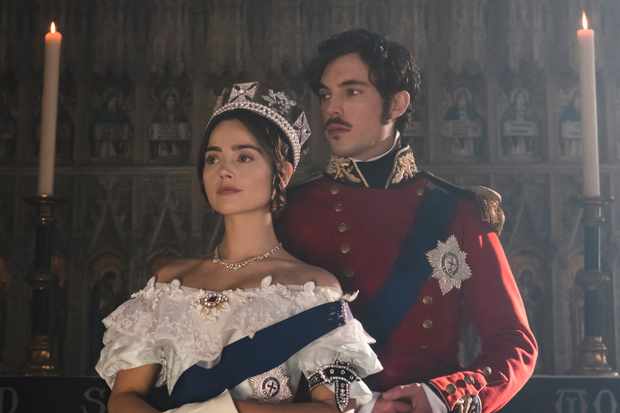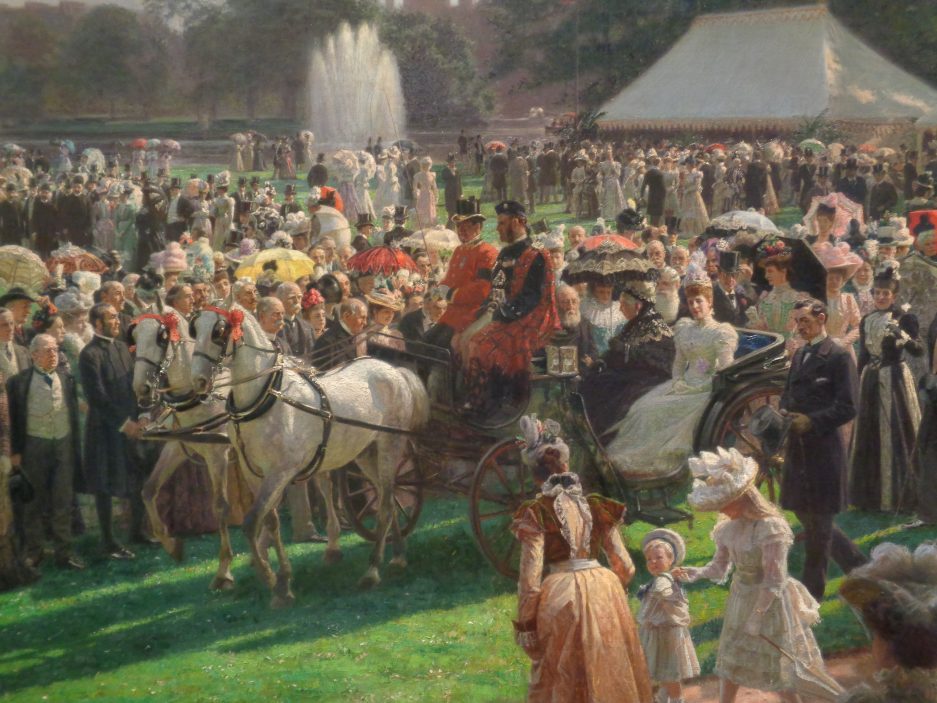Compared to the happy ending of the first series, the second series began on a sombre note – the first episode opens with a shot of the Khyber Pass in Afghanistan then shifts to Buckingham Palace where a few months have passed since the birth of the Princess Royal. It’s clear that her mother is bored, unhappy at the length of her confinement and being treated like an invalid. Finally she loses patience when being towed about in a bath chair: footmen were summoned to carry the chair down and she snaps that she’s more than capable of walking.
In Victoria’s absence, Albert has been deputising on her behalf on top of his own duties and upon receiving the news of the difficulties encountered by the army in Afghanistan resolves to hide it from his wife for fear of “distressing her”. Unaware of this turn of events, Victoria declares that she wishes to return to her duties and take up outdoor activities again which she does after grudgingly having to submit to the ritual of “churching“.
Her eagerness to resume her active life is compounded by her inability to bond with her daughter which is in contrast to Albert’s joy and optimism. Complicating matters is the meddling of her Uncle Leopold (Alex Jennings) and her father-in-law (and uncle) the Duke of Coburg (Andrew Bicknell) with the former already plotting to marry off the infant princess to a Prussian Prince while the latter is expecting that the next child will be a Prince of Wales. The constant pressure of bearing another child grates on Victoria and most likely on the viewer as well. If we are not being beaten over the head with the Queen’s Doctor McCoy-like pronouncement that she is a “queen not a brood mare” there’s also the constant reference to her supposed weak constitution following childbirth when it’s clear that she’s as fit as a fiddle and doesn’t need to be wrapped in cotton wool.

Meanwhile Afghanistan is fast becoming a disaster and the Prime Minister, Sir Robert Peel (Nigel Lindsay) believes that Britain has no business being in that area in the first place, something that many people today would agree with in the light of current events. Albert sees this military disaster as an impetus to reform the army from recruitment to promotion and even to the design of the uniforms. In the end, Victoria and the public learns of the disastrous military campaign after the remaining troops are massacred, save for Dr Brydon who managed to escape and return to Britain. Incensed that Albert has kept this information from her all this time, Victoria lashes out, also accusing him of undermining her authority and position as Sovereign.
This tension between monarch, wife, mother and woman recurs in the second episode when Albert expresses his keenness for more children: declaring his aspiration for their offspring to “shine like a beacon of domestic bliss”, a sentiment echoed by King Leopold who seconds the Duke of Coburg’s wish that the next child should be a Prince of Wales. Much like with “Operation Albert”, Leopold’s Wile E Coyote like dedication is now centred on “Operation Coburg” – he hopes that Victoria and Albert’s future children will marry into the various royal families of Europe, thus ensuring that there will be a Coburg on every throne in the continent.
Again Victoria digs her heels in. Apart from the fact that she finds being pregnant, the process of childbirth and child rearing distasteful, she is finding it hard to come to terms with being a mother and finds herself resenting the baby for changing the dynamics of her relationship with her husband. Always intellectually curious and with his interest in science and technology, Albert is invited to a lecture-demonstration by the Royal Society of Mathematics where he’s introduced to Charles Babbage (Jo Stone-Fewings) and the Countess of Lovelace (Emerald Fennell) who have worked together on a computing machine which impresses Albert, who proclaims that such devices could do the work of men in the future. Mr Babbage and Lady Lovelace are subsequently invited to a reception at Buckingham Palace honouring those in the arts and sciences. Victoria also invites Lord Melbourne (Rufus Sewell) to the event and her delight at his presence is very obvious – much to the alarm of uncle Leopold and Albert – while Victoria feels pangs of jealousy over the rapport her husband establishes with Lady Lovelace.

Episode 2 concludes with Victoria discovering that she’s pregnant for the second time much to her dismay and she turns to Lord Melbourne for advice. She admits that she finds it difficult to come to terms with being both a queen and a wife and mother and he advises her to look to her husband for support. Albert learns of the news and is happy that he will be a father again but it’s clear that Victoria is not pleased with a pregnancy so soon after her first child, seeing it as another form of prison: much like her childhood.
Certainly a theme is emerging from the first two episodes where Albert notices a change in Victoria especially with regards to their marriage. While it remains as passionate as ever, he bears the brunt of her anger which as his brother Ernst (David Oakes) perceptively points out is directed towards any attempt to control her, and that she guards her royal prerogatives fiercely and resents anything that encroaches on them. Other things this series more or less gets right is Victoria’s inability to bond with her child and her dislike of pregnancy, as well as attitudes towards childbirth and the latent anti-Catholicism prevalent in Britain during that time (as exemplified by the bigotry demonstrated by Mr Penge against Miss Cleary the new assistant dresser). Another bit that the first episode got right was the change in the Mistress of the Robes following the fall of the Whigs from power and Victoria selecting the elderly Duchess of Buccleuch (Diana Rigg) from a list provided by Sir Robert Peel to replace the Duchess of Sutherland. (Nevertheless the real life Duchess of Buccleuch was in her late twenties where she was personally selected by the Prime Minister to assume the post. Victoria thought that she was “an agreeable, sensible, clever little person” who was of great help when it came to helping organise royal tours of Scotland. The duchess’s eldest daughter was named in honour of the Queen who also agreed to stand as one of the godmothers).
However, the romance and soap opera elements never really go away and this is most acute in episode 2 where Victoria and Albert’s mutual jealousy over Lord Melbourne and Lady Lovelace are very much contrived and does not make any sense at all. If the whole point was to show how the dynamics of their marriage would change further with another pregnancy as Victoria feared, there was no need to resort to that well-worn and clichéd plot device of stirring up jealousy. Ironically, the opening episode of Edward the Seventh (1975) presented Victoria and Albert’s opposing attitudes to parenthood and the prospect of a new addition to the royal nursery much better.
Compared to series 1, series 2 so far has shown some improvement. There is far less of the shenanigans downstairs which in my opinion is as it should be because it detracts from the main narrative and further muddles it. Perhaps Daisy Goodwin should do well to remember the cardinal rule of K.I.S.S – Keep it Straight and Simple because somewhere in here is a decent drama that doesn’t need to be padded out with contrived story lines and that bane of historical drama, the importation of 21st century attitudes.

Unfortunately we have not seen this series in Australia yet, I hope one of the TV channels will pick it up soon, thanks for the review. Annette Crosby had two quit different husbands in Albert then Victor Meldrew 🙂
LikeLiked by 1 person
You’re welcome and I hope the series does air in Australia soon.
LikeLike
After our conversations about series one, I confess I have not bothered to watch this second series. Try as I might, I just cannot believe in Victoria and Albert as portrayed. They are simply too attractive, and look nothing like the real people they are depicting. Why do producers refuse to cast ‘ordinary’ looking people in TV dramas? Everyone has to be so good-looking, even the older cast members. Sad.
Best wishes, Pete.
LikeLiked by 1 person
That’s why I prefer Edward the Seventh – Annette Crosbie was believable as Victoria and the late Robert Hardy was superb as Prince Albert.
LikeLiked by 1 person
I can only concur.
LikeLiked by 1 person